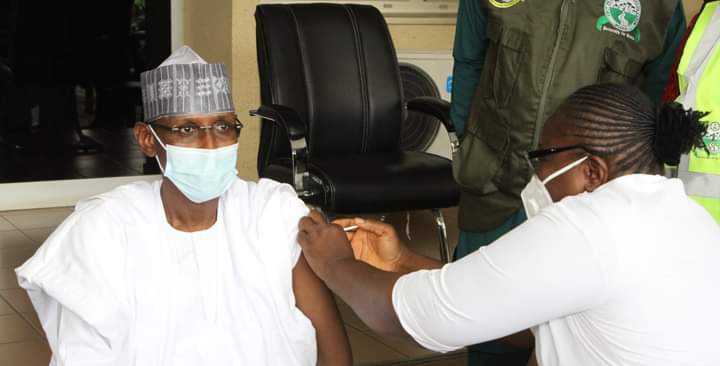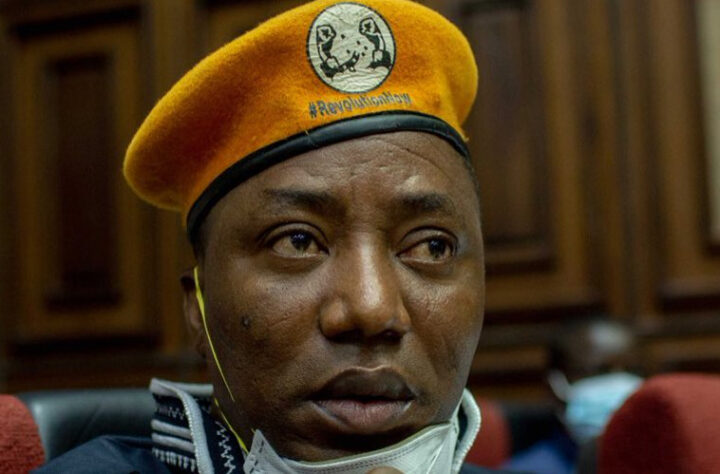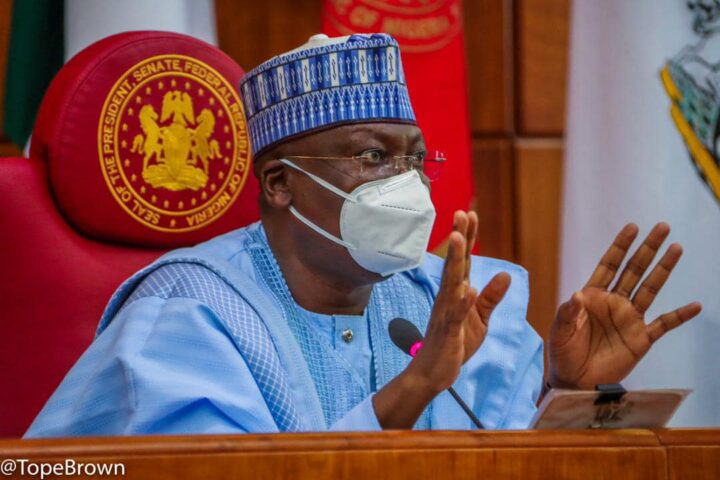In recent weeks, several fully vaccinated persons have announced that they tested positive for COVID.
In December 2021, Mohammed Bello, minister of the federal capital territory (FCT), announced that he tested positive despite having taken two shots of the vaccine.
Days before Bello’s announcement, Atedo Peterside, the founder of Stanbic IBTC and Anap Foundation, said he tested positive.
Also in December, amid reports of a wave of infections in Aso Rock, Garba Shehu, presidential spokesman, announced that he had been infected.
Advertisement
Speaking on the reports of COVID cases in the villa, Femi Adesina, aide to the president, had said there was no cause for alarm.
However, days after, the presidency issued a directive that visitors to the villa would henceforth be required to take rapid COVID tests before they would be allowed in.
With the recent spike in infection rates within and outside Nigeria, as well as reports of fully vaccinated people testing positive, there are, expectedly, concerns bordering on ‘what then is the point of vaccination?’
Advertisement
‘BREAKTHROUGH INFECTIONS DON’T MEAN VACCINES AREN’T WORKING’
According to the WHO, COVID vaccines are highly effective against serious illness, hospitalisation and death.
“A number of vaccinated people will get infected and may fall ill with COVID-19 in spite of being fully vaccinated. This is known as a breakthrough infection or breakthrough case,” the WHO said.
“Breakthrough infections can happen with every vaccine and do not mean that the vaccine does not work. People who get COVID-19 after being vaccinated are much more likely to only experience mild symptoms; efficacy against serious illness and death remains high.”
Advertisement
‘DEPENDS ON MANY FACTORS’
Oyewale Tomori, a professor of virology, said the notion that “many” fully vaccinated people have been getting COVID is not backed by evidence.
He said those with underlying diseases may not respond with the same level of robust immunity as someone without underlying disease, adding that it takes 10 days to two weeks after receiving the full dose of the vaccine for the body to mount a strong level of protective immunity.
“New variants may evade or overcome the immunity generated against existing vaccines. Immunity wanes over a period of time, hence the need for boosters,” he said.
Advertisement
“In conclusion, that a vaccinated person gets infected is neither strange nor unexpected. It depends on so many factors — level of immunity developed, interval between time of vaccination and time of exposure, and if variant virus exposed to is different from vaccine virus.”
‘VACCINES ARE MEANT TO REDUCE SEVERITY OF INFECTIONS’
Advertisement
On his part, Bayo Onajole, an epidemiologist, said the severity of infections in vaccinated persons is usually less.
“The COVID-19 virus has been having so many mutations and that’s one of the things that make people become more vulnerable to infection,” he told TheCable.
Advertisement
“But studies have shown that the severity of infections in people who have been vaccinated is not as bad as those who are not vaccinated. In spite of everything, it’s still advisable for people to be immunised.”
NPHCDA: INFECTION RATE AMONG VACCINATED PERSONS VERY LOW
Advertisement
Bassey Okposen, the director, disease control and immunisation at the National Primary Health Care Development Agency (NPHCDA), said although research has shown that people get up to 89 percent immunity after getting the vaccine, they can still get the virus if they live in a “polluted environment” and do not observe safety protocol.
He explained that the difference, however, is that they may show mild or no symptoms compared to if they were not vaccinated.
“According to NCDC, 91 percent of people who have died from COVID-19 in Nigeria are people who have never received a single dose. The other remaining nine percent are those who are yet to be fully vaccinated and those that have co-morbidity. The infection rate and severity among those who have taken the vaccine is very low,” he said.
“As a country, for us to stop transmission and reduce the rate of mutation, what we need is to attain herd immunity. We can achieve that through vaccination. Those who are yet to receive the vaccine should please help themselves, their families, and the nation by going out to receive it.”
HOW ABOUT THE ‘HIGHLY-TRANSMISSIBLE’ OMICRON VARIANT?
Omicron — labelled a “variant of concern” — was detected by South African authorities in November 2021.
As of December 20, 2021, Nigeria had recorded 45 cases of this variant amid a surge in the number of new COVID cases.
The WHO had also previously stated that Omicron is “spreading at a rate we have not seen with any previous variant”.
However, in a statement issued on January 11 by Henri Kluge, WHO regional director for Europe, the current vaccines are said to be effective in preventing severe complications that may arise from Omicron.
“Data collated in recent weeks confirms that Omicron is highly transmissible – because the mutations it has enable it to adhere to human cells more easily, and it can infect even those who have been previously infected or vaccinated,” the statement reads.
“Allow me to reiterate that the currently approved vaccines do continue to provide good protection against severe disease and death, including for Omicron.”
Add a comment






